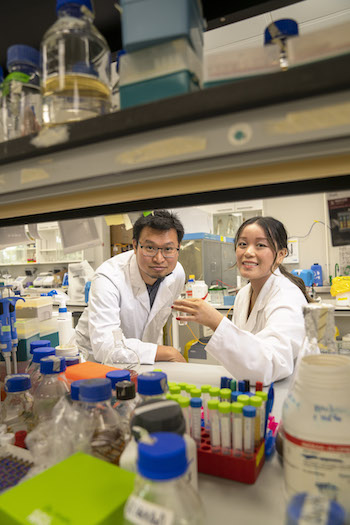Hera Nguyen is mining the genomes of fungi, unearthing a treasure trove of herbicidal molecules.
Bacteria and fungi have played a crucial role in creating natural products and their derivative, which have significantly contributed to modern medicine as drugs. Their effectiveness as drugs can be attributed to their capacity to produce a wide range of bioactive small molecules as well as their ease of culture. Penicillins are the most commonly known medicines generated from fungi, first mass produced by fermentation as an antibiotic in the 1940’s.
“Just as antibiotics are vital for disease control, herbicides are vital for weed control but resistance to both these biocides is evolving, so we must continue to search for different and novel modes of action to manage both diseases and weeds,” Ms Nguyen says.
Fungi possess an ability to generate a vast array of natural, bioactive substances which can exert both positive and negative impacts on human and plant health. The molecules are usually secondary metabolites –also known as natural products – and serve as natural antimicrobials, signaling molecules or may influence fungal development.
Fungal plant pathogens are an excellent yet untapped source of herbicidal molecules as they contain a plethora of phytotoxic natural products.
However, these molecules may only be produced under highly specific environmental conditions or certain times of a fungi’s lifecycle. Due to this, laboratory detection and replication has been challenging up to now.
Genome mining
With a scholarship from the Australian Government Research and Training Program together with investment from the GRDC and support from the University of Western Australia, Ms Nguyen has started a PhD under the supervision of Associate Professor Heng Chooi in the Molecular Science School at UWA.
Ms Nguyen’s study works in parallel with the work of Professor Joshua Mylne and Dr Joel Haywood from Curtin University’s Centre for Crop Disease and Management in discovering novel herbicide modes of action. Dr Haywood is her co-supervisor.
She is using a new emerging strategy from the field of synthetic biology known as resistance gene-directed genome mining to uncover herbicidal compounds with new mode of actions from fungi.
“Many phytotoxic natural products will be toxic to the fungi itself as they target conserved enzymes present in both plants and fungi. For survival, fungi have evolved several self-resistance strategies including resistance genes that are a duplicated copy of that conserved enzyme,” she says.
“These resistance genes are found within the gene cluster that encodes the production pathway of the phytotoxic natural product, meaning we can infer the mode of action of the natural product. This is how we can use this genome mining strategy to find bioactive molecules with desirable modes of actions – like herbicides.”
Using this new genome mining technology, I have discovered a gene cluster in the sugar beet pathogen Cercospora beticola that encodes for a natural product that may have potential herbicidal properties.
Ms Nguyen is currently assembling the genes in the production pathway for the potential herbicidal natural products in a surrogate non-pathogenic fungus Aspergillus nidulans. This will allow the production and testing of the compounds against weeds and validating their modes of actions.
“I then proceeded to overexpress the core biosynthetic enzymes of the cluster that will produce the natural product’s backbone with synthetic biology. With analytical chemistry techniques, I was able to discover two natural products produced and determine their structures.
“Some early products of the pathway have already been characterised and the structure of the compounds suggests that they may have the predicted novel mode of actions.”
“My research will involve further in-depth evaluation of these natural products to determine their herbicidal activity.”
“This discovery is an encouraging start to my PhD studies and I’ll continue to use this innovative genome mining approach to look for further fungal molecules that may have herbicidal properties. The research will also contribute to our understanding of the roles of secondary metabolites in plant fungal diseases.”
About Synthetic Biology
Synthetic biology is a new area of science that involves redesigning organisms for useful purposes by engineering them to have new abilities.
It is an interdisciplinary field that combines principles from biology, engineering, computer science, and other disciplines to design and construct new biological systems or modify existing ones. The integration of chemical biology contributes to the understanding and manipulation of these systems at the molecular level.
 Associate Professor Heng Chooi with PhD student Hera Nguyen, building capacity in synthetic biology for the benefit of the Australian grains industry. Photo: Evan Collis
Associate Professor Heng Chooi with PhD student Hera Nguyen, building capacity in synthetic biology for the benefit of the Australian grains industry. Photo: Evan Collis
It has potential applications in areas as diverse as manufacturing, human health, agriculture and protecting ecosystems.
The field of synthetic biology also raises ethical, safety, and regulatory considerations. Researchers and policymakers actively engage in discussions to ensure responsible practices and address potential risks associated with synthetic biology.
“In agriculture, synthetic biology has application in advancing crop breeding and modifying photosynthetic systems by directly improving enzyme activity, or introducing carbon concentrating mechanisms. Similarly synthetic biology could improve the biological nitrogen fixation pathway and increase the utilisation rate of nitrogen sources by crops,” says Associate Professor Heng Chooi from UWA’s School of Molecular Science.
“Meanwhile, the application of synthetic biology in microorganisms such as fungi plays a role in sustainable agriculture, developing new means of biofertilisation, biostimulation and biocontrol of both pest and diseases.”
“As yield improvements in crops are plateauing, arable land is limited and climate change poses additional threats, we face pressing issues of food security across the world.”
“We need to search for new tools to provide necessary advances and synthetic biology will provide a powerful boost.”
More information: Hera Nguyen, hera.nguyen@research.uwa.edu.au Heng Chooi, yitheng.chooi@uwa.edu.au

























































